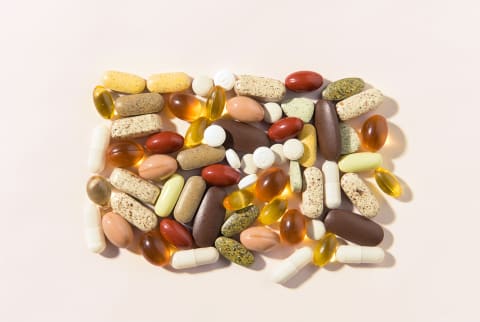Advertisement
6 Natural Ways To Support Healthy NAD+ Levels As You Age



As if you didn't have enough to think about as you get older, now you have to worry about declining levels of nicotinamide adenine dinucleotide (NAD+). This coenzyme is found in all living cells and has many important roles in the body—including supporting cells' metabolism and energy production. Most notably, it supports mitochondrial health, which are the powerhouse centers of the cell that turn our food and oxygen into energy.
A drop in NAD+ is also thought to contribute to a number of age-related and chronic health conditions. But the good news is that there are simple ways to maintain healthy NAD+ levels, including with dietary supplements and lifestyle changes.
Why does NAD decline as you age?
After adolescence, NAD+ levels decline with age1, which impairs the functioning of mitochondria and causes other changes that drive the aging process. However, it's not clear2 whether this is due to cells breaking down NAD faster or less of it being made. Research3 in mice, though, shows that an enzyme that breaks down NAD—known as CD38—increases with age. Mice that are deficient in this enzyme also have higher levels of NAD and improved mitochondrial functioning. Regardless, there are a few things that we know contribute to depleted NAD+ levels.
8 factors that contribute to depleted NAD levels:
- Aging
- Chronic inflammation and oxidative stress
- Obesity
- High-fat, high-sugar diet4
- Alcohol consumption
- Smoking cigarettes or other tobacco use
- Pollution
- Ultraviolet radiation5
- Dietary deficiencies
6 ways to support NAD levels naturally:
1. Caloric restriction & fasting diets
Caloric restriction increases NAD levels by increasing an enzyme called NAMPT (nicotinamide phosphoribosyltransferase). This is a key enzyme in the "salvage" pathway that converts nicotinamide to nicotinamide mononucleotide to NAD+.
There are a variety of caloric restriction and fasting diets. These diets reduce the total daily calorie intake and/or shift eating to certain times of the day or week.
"Intermittent fasting is probably the easiest form of calorie restriction for most people," says integrative physician Robert Rountree, M.D., "especially prolonged overnight fasting of 14 to 16 hours."
Alternate-day fasting is another option, in which you eat as much as you want every other day, with no or minimal calories consumed on other days.
Some people on these diets may experience symptoms6 such as feeling cold or tired or having headaches on energy-restricted days. People with medical conditions such as diabetes or who are taking medications such as for blood pressure or heart disease should check with their doctor before starting one of these diets.
2. Exercise
Rountree says NAD and NAMPT decrease with age in human skeletal muscle, but "aerobic exercise training increases NAMPT levels, which then increases NAD." In rats, exercise also increases the conversion of the amino acid L-tryptophan to NAD7.
Rountree says, "The best forms of exercise for raising NAD are high-intensity interval training (HIIT) and weight lifting." In one study, older and younger people who did 12 weeks of either aerobic or resistance training increased NAMPT in their skeletal muscle.
3. Ketogenic diet
The ketogenic diet is a high-fat, low-carbohydrate diet that shifts the body's metabolism away from glucose and toward ketones and fat. Studies have found that the ketogenic diet can increase the level of NAD+ in the brains of people8.
"Ketogenic diets can be effective but are very difficult to maintain long term," says Rountree. "In addition, they can cause side effects in many people, including increases in serum lipids."
Some people may also end up eating too much protein, which can be harmful for those with kidney problems.
Carnahan says she is "a fan of intermittent fasting and keto diet with a motivated individual, in combination with supplementation with oral NAD or intravenous NAD on occasion."
4. Nicotinamide riboside (NR)
Nicotinamide riboside is a natural precursor of NAD. It can also be directly converted9 in the body into nicotinamide mononucleotide (NMN), another NAD precursor. This provides an additional pathway for NR to support NAD levels.
"Nicotinamide riboside is the most efficient supplement for supporting NAD levels," says Rountree. And "it has minimal side effects in most people." Jill C. Carnahan, M.D., a functional medicine consultant, also recommends nicotinamide riboside for some of her clients.
5. Nicotinamide (NAM)
Nicotinamide, also known as niacinamide, is a form of vitamin B3 (niacin) and a natural precursor of NAD. Supplements of NAM have been found to support NAD levels in the livers of mice10.
Most dietary niacin11 is in the form of NAM or nicotinic acid. Good sources of niacin12 include yeast, meat, poultry, red fish, cereal, legumes, and seeds. It occurs in smaller amounts in green leafy vegetables, milk, coffee, and tea. NAM is also the form of niacin usually used in fortified foods and nutritional supplements.
NAM is generally well tolerated12 and doesn't usually cause flushing (as does nicotinic acid). However, at doses higher than 10 grams per day, NAM may cause nausea, vomiting, and liver toxicity.
6. Nicotinic acid (NA)
Nicotinic acid is another form of vitamin B3 (niacin) and a natural precursor of NAD. In mice, NA supports the NAD levels in the liver10 but less so than nicotinamide. NA compound occurs in the same dietary sources as nicotinamide, especially in nuts, legumes, and grains. It is also available in nutritional supplements.
Bottom line:
There are many ways to maintain healthy NAD levels as you age, but the important thing is to keep an eye on the big picture.
"Lifestyle changes such as increased exercise and intermittent fasting are the best place to start for most people," says Rountree. "Nutraceuticals will work much better when they are added as 'supplements' for an NAD-healthy lifestyle."
13 Sources
- https://journals.plos.org/plosone/article?id=10.1371/journal.pone.0042357
- https://www.sciencedirect.com/science/article/pii/S1471491417301417
- https://www.cell.com/cell-metabolism/fulltext/S1550-4131(16)30224-8
- https://www.sciencedirect.com/science/article/pii/S000629521400389X
- https://www.frontiersin.org/articles/10.3389/fphys.2019.00600/full
- https://academic.oup.com/ajcn/article/108/5/933/5201451
- https://link.springer.com/chapter/10.1007/978-1-4615-0135-0_61
- https://www.frontiersin.org/articles/10.3389/fnut.2018.00062/full
- https://www.sciencedirect.com/science/article/pii/S2468501118300063
- https://www.sciencedirect.com/science/article/pii/S0955286313001988
- https://ods.od.nih.gov/factsheets/Niacin-HealthProfessional/
- https://lpi.oregonstate.edu/mic/vitamins/niacin#sources
- https://www.ncbi.nlm.nih.gov/pmc/articles/PMC5107309/